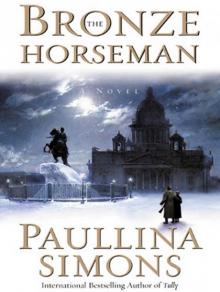- Home
- Paullina Simons
The Girl in Times Square Page 48
The Girl in Times Square Read online
Page 48
“How has that been working out, abbess? Five years now. Is his ego healed?”
“It’s a process, detective.”
“A long process, I imagine.” Spencer’s eyes were on the blank canvas.
“He has not recovered. He may never recover. I’m telling you this because he is not much of a talker, and he gets upset at the smallest things. I’m going in with you, I need you to be easy on him. Detective, are you listening?”
“Understood, abbess.” Spencer turned to her. “I heard every word you said, and I will be as soothing as I can. But I need to go and speak to him alone.”
“He needs me there.”
“He’s going to have to do without you for five minutes. If he talks to me, I’ll need no more than five minutes of his time. By the way, is there any cell phone reception here?”
“Cell phone reception?” she said, as if he were asking for reception to Lucifer.
Spencer sighed. Even his beeper was working only intermittently. He hadn’t heard from Lily since he got into Tucson early yesterday. He hoped everything was all right.
The bare room was small and overlooked the mountains that for some reason were not majestic but monastic. A white-linen bed, a white lamp, a weave throw-rug, a chair by the window. In the chair sat a small, emaciated man, appearing smaller because he had no legs. Though he was supposed to be only twenty-six, still a boy, Spencer was distracted by how old he looked, how aged. Suddenly Spencer began to wish he hadn’t left Lily alone.
69
An Anarchist in Action
Lily had gone out to get some cherries in the afternoon. She actually felt like eating something. No mistake about it—maybe her blood was like corn syrup, but Lily was better without chemo. She waved to the patrolmen sitting outside her building, and slowly trudged up the stairs to her apartment. Lily thought it was definitely time to move. The stairs stank. Fifteen-hundred dollars a month, and the place smelled worse than ever, like the homeless that were once outside were now squatting inside with no place to go. The odor got worse as she climbed the stairs, Tompkins Square Park brought home.
When she opened the door to her apartment, the stench hit her full blast. She breathed out in revulsion and gasped and tried to scream. The man with the glass eyes was sitting on her couch, his filth draped over her blankets, over her cushions.
Lily turned instantly, to run, to run, but he jumped up, spry and agile, and was on her, his hand over her mouth. His face, his broken swollen nose, his insane glass eyes were next to her. Words were tattooed in blue above his eyebrows. Now that she was close, she could read them. Aryan over one brow, Honor over the other. Hammer and sickle inked over his throat, Aryan Honor over his face. He dragged her inside and shut and bolted the door. The reek was devastating—as if a thousand unwashed men were throwing themselves on her—and, with some small subconscious satisfaction she retched and threw up against his foul hand.
He let go of her then, in visible disgust—at her! He shoved her into the kitchen where she cleaned up as best she could. He wiped himself with a paper towel and sat back down on the couch. Well, that’s it for the couch. His eyes were fixed on her. Lily managed to speak. She said, “What do you want?”
He sat motionless, rigid, his ice crystal eyes locked on her like firing sights. What could this person have to do with her funloving friend who liked to dress up, who chose her perfume for the lightness of its fragrance? He carried his stench with him like a curse.
He spoke. He said, “Where is Amy?” in a guttural American voice. She understood what he said though he garbled some of the letters, the s sounded like a zh and the r whirred. He sounded as if he had something in his mouth like a dirty washrag.
“What?” It was a gasp, not a response. His question pounded like cymbals on her heart.
“Whish part did I not enunshiate? Where izh Amy?”
She stammered. “I don’t know.” We thought you knew. How could you be asking me this? If you don’t know, then who knows?
He sighed theatrically. He sat forward and looked at her with dead eyes. “Lizhen carefully,” he said, and spoke slowly so that Lily could understand every word. “I like that you’ve left her things on her door”—he pointed to Amy’s small engraved plaque that still hung there, though Lily’s gaze didn’t follow his pointed finger—“but you’ve made her bedroom into your studio. All that art”—so derisively—“you’ve been selling on the street like a vagabond, done here. Now I know. You’re using her room. As if she’s not coming back. So you must know something. Where is Amy?”
“Who are you?” How did he get in here? The cops were outside! He must have come up through the back door, the basement.
“When you saw me in the park that night, you recognized me. Amy must have told you about me. I am Milo. Now what have you done with her?”
She was staggered back against the wall across from him, next to Amy’s door, next to Amy’s plaque. “We’ve been looking for her for over a year,” she finally got out.
“Don’t lie to me. I know what you’ve been doing—you haven’t been looking for her. You got sick, been taking care of yourself. You got money from somewhere, been spending it, investing it with Smith Barney. You’ve been playing a little comedy with that detective of yours, like he could find the truth on his ass. But I’m tired of playing. This is the end game. You tell me right now where Amy is.”
“I don’t know!” Lily’s voice was high pitched and shrill. She glanced at the fifty clocks arranged on a wall above his head. What time was it in Arizona? It was late afternoon here.
Milo laughed, a harsh choking sound. “Yes! Very arty of you to have the clocks ticking out your time. And by the looks of you, I don’t think you’ve got much. You might want to buy some more clocks, and set them back, set them slow, see if they can give you a couple of extra minutes.”
Lily’s eyes measured the distance to the door.
“He’s not coming. Friday is his day off from you. Tonight he drinks, carrying his mistress in his arms all the way from Soho.” Milo smiled, showing his rotting teeth. “I follow him, too. I follow you, him. But let me tell you something, I’m not interested in him, or you. I’m interested in only two people. One of them is Amy. Do you know who the other one is?”
Lily shook her head, sinking down to the floor before she could hear about the other.
“And the other is your brother, the honorable congressman, Andrew Quinn.”
She groaned. Oh my God. Where are you Spencer, where are you?
“You think your brother knows where Amy is? Because if he knows, you must know.”
“He doesn’t know. And he tells me nothing.” He told me nothing, Amy told me nothing. What am I going to do? Spencer, Spencer.
Lily did the only thing she could do. She fainted.
When she came to, she was on the wood floor and he was still sitting on the couch looking at her with detachment. “Would you like a drink of water?” he asked. “I would offer you some drugs, but I’m afraid the only thing I’ve got will be no good for your condition, though it happens to be very good for mine.” His rag sleeves were rolled up. Lily wished the afternoon light weren’t so bright, exposing the vicious black and blues on the inside of his forearm. His other forearm was swallowed up in a tattooed mosaic of symbols, black swastikas intermingled with green Islamic crescents and red hammer and sickles.
He had a rubber band already tightened around his upper arm, and the needle was in his hands. “You’re not squeamish about needles, are you, Lily? Probably not, since the needles are keeping death at bay from you.” Milo exposed his teeth again. “Though not too far away. Just in the corridor.”
The needle went inside his flesh, and his thumb depressed the plunger. Nearly instantly, his eyes glossed over and his head tottered back. His mouth started to make gurgling noises.
Maybe he’ll OD here, Lily thought, the panic inside her very great. While his head was still back, she crawled to the phone, and hid it under her thin shirt. Sh
e kept moving toward the door, but his head came up, eyes half closed, and she froze, and then pressed TALK on the phone and dialed Spencer’s beeper number by feel. She waited a second, her fingers at the microphone blocking the sound of Spencer’s voice telling her to leave a number and then pressed 9-1-1-9-1-1-9-1-1-9-1-1.
She decided to call 911. She managed to dial but not to speak, because Milo now glared at her. “What are you doing?”
She pressed OFF on the phone and remained on the floor. “I told you, I don’t know where Amy is. You think if I knew, we wouldn’t have found her?”
Milo sighed again, but he looked happy now. His body was as relaxed and dazed as his beaten face.
“What do you want?” she whispered.
“What, Amy never talked about me to her best friend Lily?”
“Who are you?”
“We are the revolution, Amy and I”, said Milo, with ludicrous triumph. “We came to change the order of things.”
The phone rang. It rang under Lily’s shirt where she was hiding it. Spencer!
Milo raised his eyebrows. His glass eyes narrowed, he looked like an apparition, ghostly white, permanently beat up, scarred, tattooed. He looked like he had come from the netherworld for Lily, as if he were a horseman of the apocalypse. Lily couldn’t read the caller ID. She just pressed TALK and cried, “Spencer, help me…”
Milo stood up slowly, as if in a dream, and hit her across the face, knocking her out.
70
Massacre Grounds
The abbess was right—Hobbit didn’t want to talk. He sat by the window and made no sound, did not cast even a surreptitious glance at Spencer and Gabe. They sat down on the bed to appear less threatening to him, but that seemed to threaten him even more, because his body started twitching spasmodically until they stood up.
So they stood, and he sat, calmer, and looked out the window. When they asked him about Amy McFadden, he blinked but did not reply. When they asked him about Lindsey Kiplinger, his eyes welled up but he did not reply. When they asked him about Milo, he started to shake. When they showed him Milo’s picture, he started to cry.
Finally! Somebody recognized Milo! Oh, that sharp-thinking Lily.
But Hobbit cried silently. Spencer told him they would not leave until they got the information they needed. “We’re here because Amy has gone missing, Hobbit. Suspicion has fallen on this man, known to us only as Milo. What we need is for you to tell us who Milo is and what relationship he had to Amy.” This was as simple as Spencer could make it for the wreck sitting by the window. He waited for his answer, the silence stretching. Gabe had no patience; he was seething with frustration. He wanted to threaten the answers out of Hobbit and be on his way. Gabe dealt with too many people in homicide with whom nothing but menace worked. But Spencer knew that each interrogation was different. You had to identify with the subject, and sometimes if that meant standing around in a convent until the sitting subject got comfortable enough with you to speak, so be it.
Gabe and Spencer paced. Hobbit didn’t like that. Spencer sat on the floor, lotus style, next to his chair. Hobbit seemed to like that a little better.
His hands in a teepee, sitting cross-legged, Spencer asked again, “Who is Milo, Jerry?”
Hobbit spoke his first coherent phrase of the day. “Hobbit’s my name.”
“Who’s Milo, Hobbit?”
It was five long minutes before Hobbit replied.
“The church said Milo was the anti-Christ.”
“The Native American Church?”
“Milo was thrown out of it.”
“Why did the church call Milo the anti-Christ?”
Silence.
Hobbit had clammed up. He did not make eye contact.
“I didn’t know the church followed Christian precepts,” Spencer said, calmly pressing his tense fingertips together.
Seven minutes passed. Spencer felt himself churning inside. Something was welling up in him, a little dervish snowballing into a scream in his throat. GET IT OUT!
As though obeying Spencer’s thoughts, Hobbit said in a quiet voice, “Yes, it follows Christian precepts. Which is why Asuncion took me. The church reads from the Bible, it incants Christ. It takes communion. Just not in the form you Catholics understand.”
Ah. So, surprisingly eloquent when pushed to speak. Ego, no ego, psychosis, no psychosis—language, like bike-riding, was not forgotten. “What form does it take then?”
After a long pause Hobbit said, “A different form.”
Gabe said, “A peyote form, perhaps?” Gabe was not sitting on the floor and his fingers were not pressed together but his fists were being clenched and unclenched. Spencer motioned to him to calm down.
“The peyote,” said Hobbit haughtily, “is the incarnation of God. Just as Christ came in the form of man and was resurrected after death as God Himself, so in the Native belief was God reincarnated as peyote. When we take peyote, we take in God. We are not supposed to do it for the visions. We do it for purification, as a form of communion—to be one with God. Through the peyote, we receive the body of Christ.”
“Hobbit, Hobbit,” said Spencer, himself growing impatient. “I don’t need your blasphemy, you explaining to me how mindaltering drugs are now the Eucharist. What I need is…”
Hobbit said, “I’m telling you why the shaman in Nogales said Milo was the anti-Christ. He said that Milo’s only belief was nonbelief. Rejection of belief. He said Milo was a nihilist.” Hobbit smirked. “And he didn’t even know us.”
“How did you and Milo know each other?”
“From high school.”
“What was his name before he was Milo?”
“His name had been Ben Abrams. But Ben Abrams died when we took our new form, and Milo was born, just as Jerry Clark died and Hobbit was born.”
Spencer and Gabe exchanged a look. Was the name Ben Abrams familiar in some way? His mind was reeling. He wished he had cell phone reception so he could call in the name before they continued the interview.
Hobbit said, “I was certain Milo was…” and stopped there, but Spencer hoped it was just a pause, and it was, because the boy said another word: “Dead.”
“Why did you think that?”
“His injuries.” Hobbit shuddered.
Injuries, Spencer wondered. They would have to get to that. “Well, he’s not dead. What about him and Amy?”
“He and Amy were the center of it all.”
“Center of what?”
“Our little band of radical brothers and sisters. We went out to see the world that we had hoped to change.” He didn’t want to say any more.
“Amy as well as Milo?”
“Amy as much as Milo.”
“They were together?”
“Yes.”
Spencer showed him the picture of Milo again.
“You mean this pulverized, crazy-looking guy and regular, middle-class, attractive Amy were together?”
“He was our shaman. He didn’t always look like this, detective. Milo was superlative once.”
“With this hidden underneath?”
“No one saw it. Least of all Amy. She was completely under his spell. Her home life was a mess, she was wallowing, unfocused, not knowing anything. She was younger than us, I think. And Milo pulled her in good. He pulled her under his sway.”
Hobbit was becoming agitated. Spencer guessed Milo was like that with everyone, and Jerry Clark had been very much dominated by him also.
“Hobbit, what were you doing with your life on the road?”
“When Milo said go here, we went here. When he said listen to Bane, we listened to Bane. When he said, join ATWA—Air Trees, Water, Animals—we joined ATWA. Join American Nihilist Underground Society, we joined. When he said, learn about the Russian Nihilists, we learned. Read about Libertarian Communists, about Pentii Linkola, about rational humanists, we read. He said join the Native American Church, we joined the Native American Church. He said go to Nogales, we went to Nogales. We
were free, young, exploring, we hated all that absolutist bourgeois morality shoved down our throats, and rejected that life. We believed in other things. And we followed Milo.”
“ATWA,” said Spencer slowly. “Isn’t that Charles Manson’s little Death Valley group?”
“And American Nihilist Underground Society,” said Gabe, “Isn’t that ANUS?”
“Whatever, man. We were experimenting.” Sensing derision, Hobbit fell mute and would not reply to any more questions.
Spencer frowned. Getting up off the floor, he sat on the white linen bed. Hobbit flinched, but Spencer didn’t move this time. “Jerry,” he said, “I know you don’t want me to call you that, and I know that you don’t want me to sit on your bed. But I’m out of patience. Open your mouth and speak to me. I’m not leaving until I know everything. Did you join the church so you could worship peyote?”
Hobbit shook his head in disapproval. “Don’t say peyote as if you’re spitting the word out. I told you, peyote is instrumental to the church. It is the god of the church.”
“Mmm. Doesn’t leave much room for actual God though, does it?”
“Yes it does. You become closer to Christ with—”
“What Christ, Hobbit? Christ didn’t teach nihilism, which seems to be what all of you learned so well.”
“What do you know about nihilism?”
“As a lapsed Catholic, I know something about Christ. He didn’t teach that life was pointless and all human values worthless. He was not a skeptic who denied all existence.”

 The Summer Garden
The Summer Garden Six Days in Leningrad
Six Days in Leningrad Bellagrand
Bellagrand Tatiana and Alexander
Tatiana and Alexander Road to Paradise
Road to Paradise The Bronze Horseman
The Bronze Horseman Eleven Hours
Eleven Hours Tatiana's Table: Tatiana and Alexander's Life of Food and Love
Tatiana's Table: Tatiana and Alexander's Life of Food and Love The Girl in Times Square
The Girl in Times Square The Tiger Catcher
The Tiger Catcher Lone Star
Lone Star Children of Liberty
Children of Liberty A Beggar's Kingdom
A Beggar's Kingdom Inexpressible Island
Inexpressible Island Tatiana and Alexander: A Novel
Tatiana and Alexander: A Novel Tatiana's Table
Tatiana's Table A Song in the Daylight (2009)
A Song in the Daylight (2009)